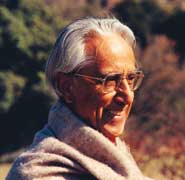


 Symbol
Symbol

Symbol
“The symbolon is not another thing, as is the sign, nor is it the reality; rather it is that which appears through it precisely as symbol … All symbol is symbol because it symbolizes and not because it is interpreted by its contents … If language were simply an instrument to designate objects or merely transit information, no discourse on God would be possible (The experience of God).
For Panikkar, symbol is the basic element of religion, and he addresses what symbol is in many places throughout his work. The symbolon is not an epistemological sign, but rather the manifestation of that which reveals itself only through the symbolon. Symbol comes from symballein, “to bring together”, to relate two different things; therefore, it is not simply objective nor purely subjective, “but rather constitutively a relationship … reality itself does not break even in the subject/object dichotomy”. For this reason, the symbol is only symbol for those who relate directly with it, and thereby symbol constitutes an authentic mediator. The very word God is “a symbol that reveals and veils itself in the symbol” (The experience of God).
In contrast to concepts, which attempt to be univocal, symbols are polysemous, and thus, eminently relational, relating subject and object: “The symbol is symbol when it symbolizes, and when it is recognized as such. A symbol that does not speak directly to the one perceiving it ceases to be symbol … Consequently, for Panikkar, “to recognize being as symbol is to open a new chapter in the encounter of cultures and conceptions of the world” (“Philosophy as a stylelife”).
Panikkar critiques Plato’s and Aristotle’s notions of symbolon that so determined the concept in the West. The classical Greeks try to distinguish the symbol from what it signifies: symbols simply reflect or prefigure in an obscure way ideals and archetypes. For Panikkar, however, this is the expression of a typical defect of Western culture with its separation between the heavenly and earthly worlds. In the thought of Panikkar, the symbol does not point to another reality. Rather, that which is symbolized is present to us in and through the symbol.
The symbolic difference attempts to express the symbolic structure of all reality, which transcends the subject-object dichotomy, situating itself in the very relationship between the subject and object. It is the “existing difference between symbol and reality”; a difference that is neither epistemological nor ontological, but symbolic: “what reality is, is its symbol; the is, is the symbol of the real”
official site